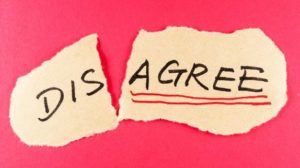英語で agree to disagree という表現があります。
二人が意見を戦わした後に、たとえば次のように言ったとします。
Let’s agree to disagree.
これは、「意見の違いと言うことで(この場はとりあえず)収めよう」という意味です。
今回は、BBC放送から、英国人が考える agree to disagree の方法についてです。
”Disagreeing is normal.” This is what the Dalai Lama said. It would be boring if we agreed about everything. However, we guess agreement, on some things, may have prevented a few wars.
「意見の相違は当たり前のことだ」これはダライ・ラマが言った言葉です。すべてについて意見がぴったり一致するなんて本来あまりあり得ないですし、そうなったらむしろ退屈でしょう。とはいえ、過去には合意ができたからこそ戦争に至らなかったケースがあったことも事実です。
Indeed, but it is a fascinating subject and it’s something the BBC Radio 4 programme ‘A Guide to Disagreeing Better’ looked at. We should hear about how NOT to disagree first. This is couples’ therapist, author and speaker Esther Perel, who knows a thing or two about that…
確かに、これは議論しがいのあるテーマであり、これについては、BBC Radio 4の番組、「意見の不一致をうまく収めるためのガイド」で放送をしました。最初から異議を唱えてはいけないという意見に耳を傾けましょう。夫婦などのカップルのセラピストであり、本の著者であり講演者でもあるエステル・ペレルが語ります。
 Esther Perel, therapist
Esther Perel, therapist
In a battle, you position yourself in a hierarchy – one is on top of the other, and then there is arguing that comes with a contempt in which it’s not just that I don’t accept your point of view, is that, I actually really think you’re a lesser human being.
エスター・ペレル(セラピスト)
論争では、ひとは自分を「ヒエラルキー(階層)」に組み込んでしまいます。自分が相手の上にあるとの前提に立ち、そこから侮蔑を伴った主張が出てきます。この気持ちの中には、自分は相手の視点を受け入れないだけではなく、心底から相手を劣った人間だという思い込みが入っているのです。
Esther explains that bad disagreement is a battle – one person tries to take a higher position in the hierarchy. A hierarchy is a way of organising people according to their importance.
エステルは、「悪しき意見の不一致」は一種の戦争だと説明しています。ひとはヒエラルキーの中で他の人より高い地位に就こうとします。ヒエラルキーとは、人を重要度で分けて1つの秩序としてまとめてしまう制度です。
So, a disagreement doesn’t go well if one person thinks they’re more important than someone else. And according to Esther, things also don’t go well if someone has contempt, which is a dislike or lack of respect for someone or something.
したがって、ある人が他の人たちよりも自分が重要だと思っている場合に意見は合致しません。また、エステルによれば、相手に対して侮蔑の気持ちを抱いている人がいると物事はまとまりません。侮蔑とは、誰かまたは何かに対する嫌悪や敬意の欠如を意味します。
Let’s think more now about good disagreement. The BBC podcast Seriously has listed some tips for disagreeing better, including not aiming for the middle ground – another way of saying ‘compromising’.
意見が一致しないときにどうすればうまく収められるかについてもっと考えてみましょう。 BBCポッドキャストは意見の相違を改善するためのいくつかのヒントをリストアップしました。
It also suggests speaking truthfully, listening intently – that means giving all your attention to what’s being said – and aiming for empathy. But not feeling at the end of a disagreement that you have to agree!
そこで示唆しているのは、誠実に話すこと、熱心に耳を傾けること(発言内容に注意を向けること)、共感を目指すことです。 しかし、意見が不一致に終わっても、合意しなければならないと思いこむ必要はないのです。
We are sure former British politician Douglas Alexander would too. He presented the programme ‘A Guide to Disagreeing Better’ and explained why he thought disagreeing is a good thing…
英国で長年政治家を務めたダグラス・アレクサンダーもそれを肯定するはずです。「意見の不一致を改善するためのガイド」の番組で意見が食い違うことの方がむしろ良いことだと彼が思う理由を説明しています。
Douglas Alexander
A couple of decades I spent as an elected politician convinced me that disagreement is necessary if society is to progress and a society that values civility over justice and truth would simply be a recipe for stagnation. But honest conversations involve listening intently as well as speaking truthfully.
ダグラス・アレクサンダー
選挙で選ばれた政治家として過ごした数十年で、自分が確信したことはこうです。社会が進歩するためには意見の相違が必要であり、正義と真実を差し置いて「礼儀正しさ」を重視する社会は停滞を招くということです。ただし、正直に会話をかわすことには、熱心に耳を傾けるだけでなく、誠実に話すことも含まれています。
The thoughts of Douglas Alexander there, who, through his work as a politician, is convinced that disagreement is a good thing. He says we shouldn’t just follow the values of civility – that means polite behaviour. It’s important to challenge and question thoughts and ideas – not just be polite and accept them!
ダグラス・アレクサンダーは、政治家としての仕事を通して、意見の不一致は良いことだと確信しています。彼は「礼儀正しさ」の価値に従うだけではいけないと言っているのです。礼儀正しさを重視しすぎて相手を無批判に受け入れるのでなく、相手の考えに異議を唱え、質問することは重要だと言っています。



最近のコメント